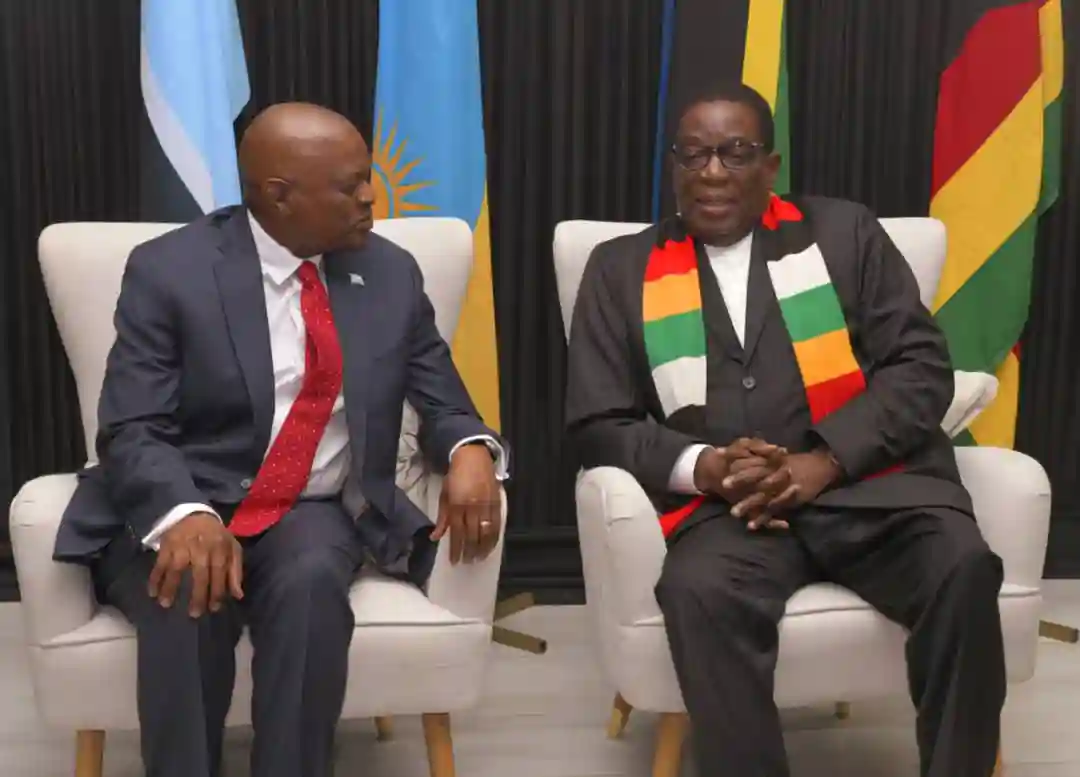President Emmerson Mnangagwa on Thursday said that he had agreed with his Botswana counterpart President Mokgweetsi Masisi to scrap passport requirements and allow Zimbabweans and Batswana to move unhindered between the two countries.
Speaking during the fifth edition of the annual Kusi Ideas Festival in Gaborone, Botswana, Mnangagwa said the terms of the agreement will be worked out by officials from both countries. ZimLive quoted Mnangagwa as saying:
I have been talking to my brother here (Masisi) after he was making a statement here and we have agreed, I can announce, that from now on we shall instruct our officials that there shall be no question of how to enter Zimbabwe, how to enter Botswana.
That should be cleared. The two of us have agreed, realising that we are Africans. We should be able to walk into Botswana, walk into Zambia and walk into Kenya. We agreed when we were sitting there that why should we restrict ourselves?
Somebody said in the past we were all living together, then the global north came and made boundaries, where the family’s kitchen became on the other side of the border, the bedroom on the other side of the border. So why should we continue to respect this? Let us open the borders among ourselves and move freely.
Speaking to Zimbabwean journalists after attending the Kusi Ideas Festival, Mnangagwa said the envisioned deal with Botswana would mean travellers only require their respective national identity documents to travel between the two countries. He said:
We impose constraints on ourselves which are more colonial than they are patriotic, so we agreed that he (President Masisi) himself on his side and myself on my side are going to instruct the relevant departments to ease these constraints of movement of people between our two countries.
It should be enough for someone having an identity card to cross into Zimbabwe or cross into Botswana, so this is what we are going to do.
He has undertaken to talk to his ministers to facilitate that; I will do the same in Zimbabwe to make sure we facilitate the movement of Zimbabweans and Batswana between the two countries without any constraints except one’s ID (identity document).
In his keynote address at the Kusi Ideas Festival, Masisi said his government officials have commenced consultations to ensure that the passport-free dispensation with Zimbabwe becomes a reality. He said:
Our steps towards facilitation of the implementation of the African Continental Free Trade Area are being given impetus by policy action taken by some sister nations like Kenya, who have announced the intention to abolish visa requirements for Africans travelling to Kenya.
I guess speaking for ourselves, President Mnangagwa, the ball is in your court and mine. We shall talk.
We, on our part, have since April this year initiated an even easier movement between ourselves and neighbouring Namibia, by which citizens of both nations can travel between the two countries using only their national identity cards as a travel document.
This has reduced the burden of acquisition of passports for travel to either country. We hope that with time this will become a feature of the subcontinent and eventually the continent as a whole.
And yes, once again, President Mnangagwa, I am happy to tell you that I have begun consultations on my side; I wish you begin on yours so that next after Namibia will be a Zimbabwean ID holder travelling seamlessly to Botswana, and a Botswana citizen . . . travelling seamlessly to Zimbabwe.
Botswana has a population of 2.5 million and is one of Africa’s most stable countries.
In contrast, Zimbabwe’s population is above 16 million and the country has been in economic turmoil for more than two decades.
Botswana, like all of Zimbabwe’s neighbours, hosts a sizeable Zimbabwean migrant community and deports thousands of Zimbabweans annually for immigration offences.
Meanwhile, Botswana already signed a similar arrangement with Namibia. The two countries are accepting each other’s national identity cards for use in cross-border business and tourism travel for stays of up to 90 days.
More: Pindula News

